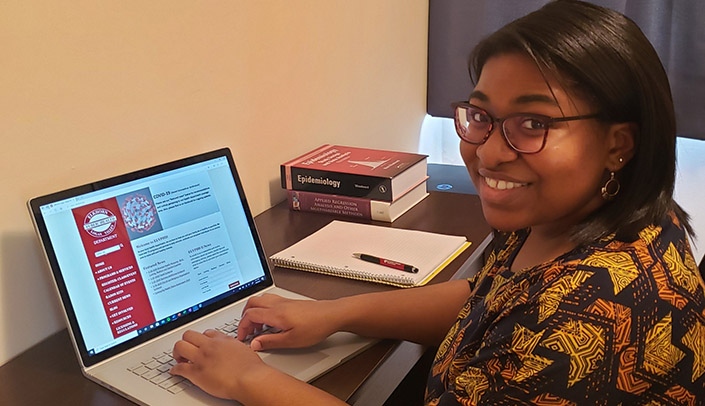The call for assistance from the Douglas County Health Department came in early February. At that time, several passengers from a cruise ship where people had tested positive for COVID-19 were on their way to Nebraska to quarantine at Camp Ashland.
Sierra Garth, a second-year master of public health student at UNMC, and several other students eagerly responded. Their task — monitor social media sites and document public sentiment about the quarantined cruise ship passengers. That task later evolved into helping trace contacts of people who were exposed to a COVID-19 positive patient and following up by calling patients in self-quarantine for health updates.
Garth, who is president of the UNMC College of Public Health Student Response Team (SRT), said the main objective at the time was to find out what people were posting about the passengers, what questions they were asking about coronavirus and what articles were being shared.
“Everything was documented in spreadsheets so the health department could see what folks were saying and what the mood was,” Garth said.
Her role since then has shifted from being physically present at the offices of the Douglas County Health Department to working with the Elkhorn Logan Valley Health Department remotely from home and helping to monitor their social media sites as it relates to COVID-19.
“It can be overwhelming at a time like this to try to continue to do daily work and provide a timely response on social media, and this is just one way we as public health students can help lighten the load,” Garth said.
Currently, there are 50 COPH students registered and ready to help, said Sharon Medcalf, Ph.D., assistant professor in the department of epidemiology in the UNMC College of Public Health.
Dr. Medcalf implemented the SRT a little more than five years ago as a way for students to engage with and learn from public health departments. The SRT also stood ready to offer assistance to public health departments in the state should the occasion arise.
There were other models for student response teams in a few other universities, but Dr. Medcalf said her vision was to expand their expertise beyond only helping in outbreak investigations.
Aside from mining social media sites during a disaster, the students are also trained to help with the operation of mass dispensing and immunization operations at “points of dispensing” sites in public health plans.
“This will be very important when a vaccine for COVID-19 becomes available and our local health departments are tasked with getting their entire communities vaccinated,” Dr. Medcalf said.
The work the students now are doing and have done is invaluable, she said.
In the beginning, the SRT students were going to the offices of the Douglas County Health Department, where they were able to see the work of officials behind the scenes.
“I never realized how extensive their work is, and just seeing how they plan, how they implement that plan as a team, the communication among the staff at the health department, it is incredible to witness those efforts at this unprecedented time,” Garth said.
Sabrine Chengane, a senior master of public health student and vice president of the SRT, also volunteered at the Douglas County Health Department, following up on people who were exposed to COVID-19. She now is working remotely doing social media monitoring.
A Fulbright Scholar from Algeria, Chengane said she has learned how important the work of public health departments is during an emergency response.
“My background is in pharmacy, my interests are in maternal, child and global health, and all of this is interrelated when it comes to an emergency response of this magnitude as the needs of different population groups can vary,” she said.
The opportunity to work with the public health departments has shown Chengane the value of providing students with practical experience, which she said better prepares them for their future careers. The experience also leads her to wonder how pharmacists can be utilized more during an emergency response and what that would look like.
“In Algeria, when you are sick with mild symptoms, it is common to approach pharmacists first before you go to the doctor,” she said.
At a time when there are health care workforce shortages, pharmacists might be able to fill a gap, Chengane said, such as addressing rumors and managing health care resources to help avoid shortages.
For now, Chengane and Garth said they will continue to do all they can to support the public health departments across the state that have called upon them for help.
“It’s great opportunity for us to learn as students and contribute to the cause,” they said.

COPH Students are Rockstars!
Thank You SRT College of Public Health Students for sharing your expertise, time and talents in this battle. And Thank You Sharon for having the foresight to create the SRT, a mighty Public Health force that can be activated at a moment's notice. Nebraska is lucky to have all of you!
Our students are AWESOME!